Journal of Hospitality: Brand Prestige in Upscale Restaurants
VerifiedAdded on 2023/01/05
|26
|13013
|38
Report
AI Summary
This report analyzes the research paper "The Impact of Brand Prestige on Trust, Perceived Risk, Satisfaction, and Loyalty in Upscale Restaurants," published in the Journal of Hospitality Marketing & Management. The study, authored by Jin, Line, and Merkebu, investigates the significant influence of brand prestige on crucial customer behaviors within the luxury dining sector. It explores the intricate relationships between brand prestige, perceived risk, trust, customer satisfaction, and customer loyalty. The research reveals that brand prestige positively impacts trust, satisfaction, and loyalty, while perceived risk negatively affects these outcomes. Furthermore, the study highlights the positive effect of trust on satisfaction and loyalty. The authors provide theoretical and managerial implications, emphasizing the importance of brand prestige as a nonreplicable asset for sustainable competitive advantage in the upscale restaurant market. The research underscores the need to understand the nomology of the prestige construct, particularly in the context of fine dining, where consumer behavior is highly influenced by perceptions of prestige and the associated high price points. The study's findings offer valuable insights into how restaurants can leverage brand prestige to enhance customer relationships and drive business success. This report is available on Desklib, a platform offering AI-powered study tools for students.
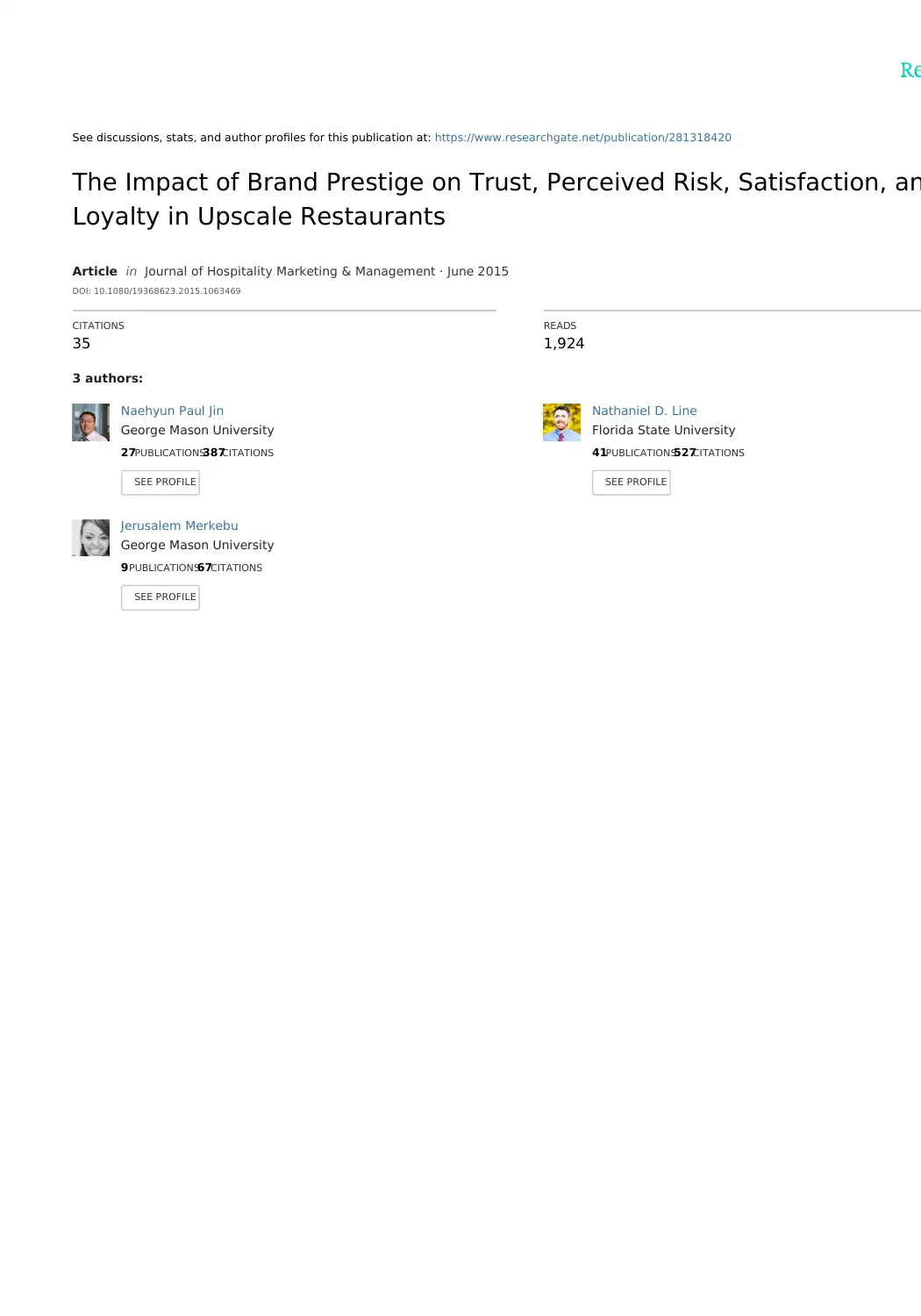
See discussions, stats, and author profiles for this publication at: https://www.researchgate.net/publication/281318420
The Impact of Brand Prestige on Trust, Perceived Risk, Satisfaction, an
Loyalty in Upscale Restaurants
Article in Journal of Hospitality Marketing & Management · June 2015
DOI: 10.1080/19368623.2015.1063469
CITATIONS
35
READS
1,924
3 authors:
Naehyun Paul Jin
George Mason University
27PUBLICATIONS387CITATIONS
SEE PROFILE
Nathaniel D. Line
Florida State University
41PUBLICATIONS527CITATIONS
SEE PROFILE
Jerusalem Merkebu
George Mason University
9 PUBLICATIONS67CITATIONS
SEE PROFILE
The Impact of Brand Prestige on Trust, Perceived Risk, Satisfaction, an
Loyalty in Upscale Restaurants
Article in Journal of Hospitality Marketing & Management · June 2015
DOI: 10.1080/19368623.2015.1063469
CITATIONS
35
READS
1,924
3 authors:
Naehyun Paul Jin
George Mason University
27PUBLICATIONS387CITATIONS
SEE PROFILE
Nathaniel D. Line
Florida State University
41PUBLICATIONS527CITATIONS
SEE PROFILE
Jerusalem Merkebu
George Mason University
9 PUBLICATIONS67CITATIONS
SEE PROFILE
Paraphrase This Document
Need a fresh take? Get an instant paraphrase of this document with our AI Paraphraser
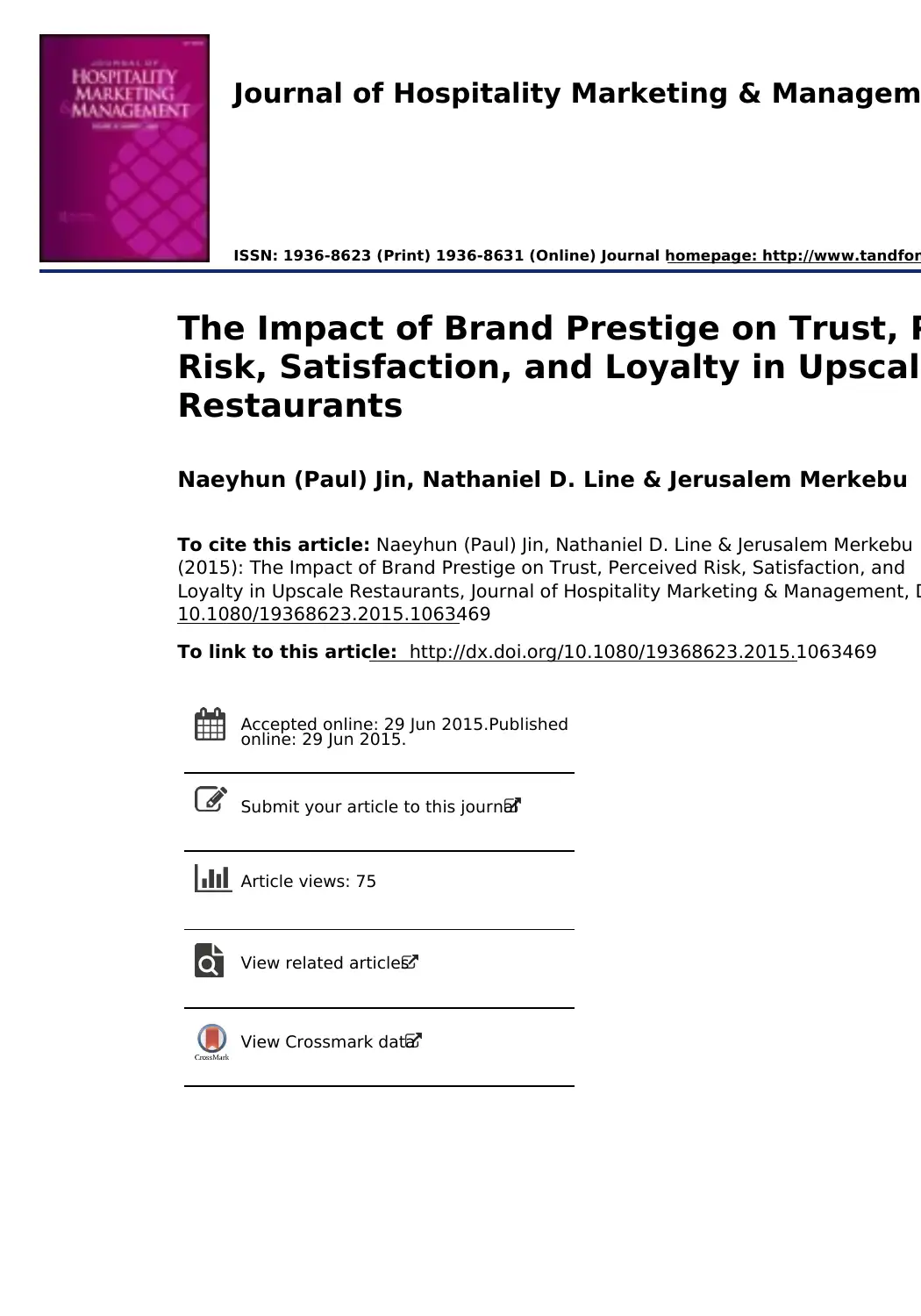
Journal of Hospitality Marketing & Managem
ISSN: 1936-8623 (Print) 1936-8631 (Online) Journal homepage: http://www.tandfon
The Impact of Brand Prestige on Trust, P
Risk, Satisfaction, and Loyalty in Upscale
Restaurants
Naeyhun (Paul) Jin, Nathaniel D. Line & Jerusalem Merkebu
To cite this article: Naeyhun (Paul) Jin, Nathaniel D. Line & Jerusalem Merkebu
(2015): The Impact of Brand Prestige on Trust, Perceived Risk, Satisfaction, and
Loyalty in Upscale Restaurants, Journal of Hospitality Marketing & Management, D
10.1080/19368623.2015.1063469
To link to this article: http://dx.doi.org/10.1080/19368623.2015.1063469
Accepted online: 29 Jun 2015.Published
online: 29 Jun 2015.
Submit your article to this journal
Article views: 75
View related articles
View Crossmark data
ISSN: 1936-8623 (Print) 1936-8631 (Online) Journal homepage: http://www.tandfon
The Impact of Brand Prestige on Trust, P
Risk, Satisfaction, and Loyalty in Upscale
Restaurants
Naeyhun (Paul) Jin, Nathaniel D. Line & Jerusalem Merkebu
To cite this article: Naeyhun (Paul) Jin, Nathaniel D. Line & Jerusalem Merkebu
(2015): The Impact of Brand Prestige on Trust, Perceived Risk, Satisfaction, and
Loyalty in Upscale Restaurants, Journal of Hospitality Marketing & Management, D
10.1080/19368623.2015.1063469
To link to this article: http://dx.doi.org/10.1080/19368623.2015.1063469
Accepted online: 29 Jun 2015.Published
online: 29 Jun 2015.
Submit your article to this journal
Article views: 75
View related articles
View Crossmark data
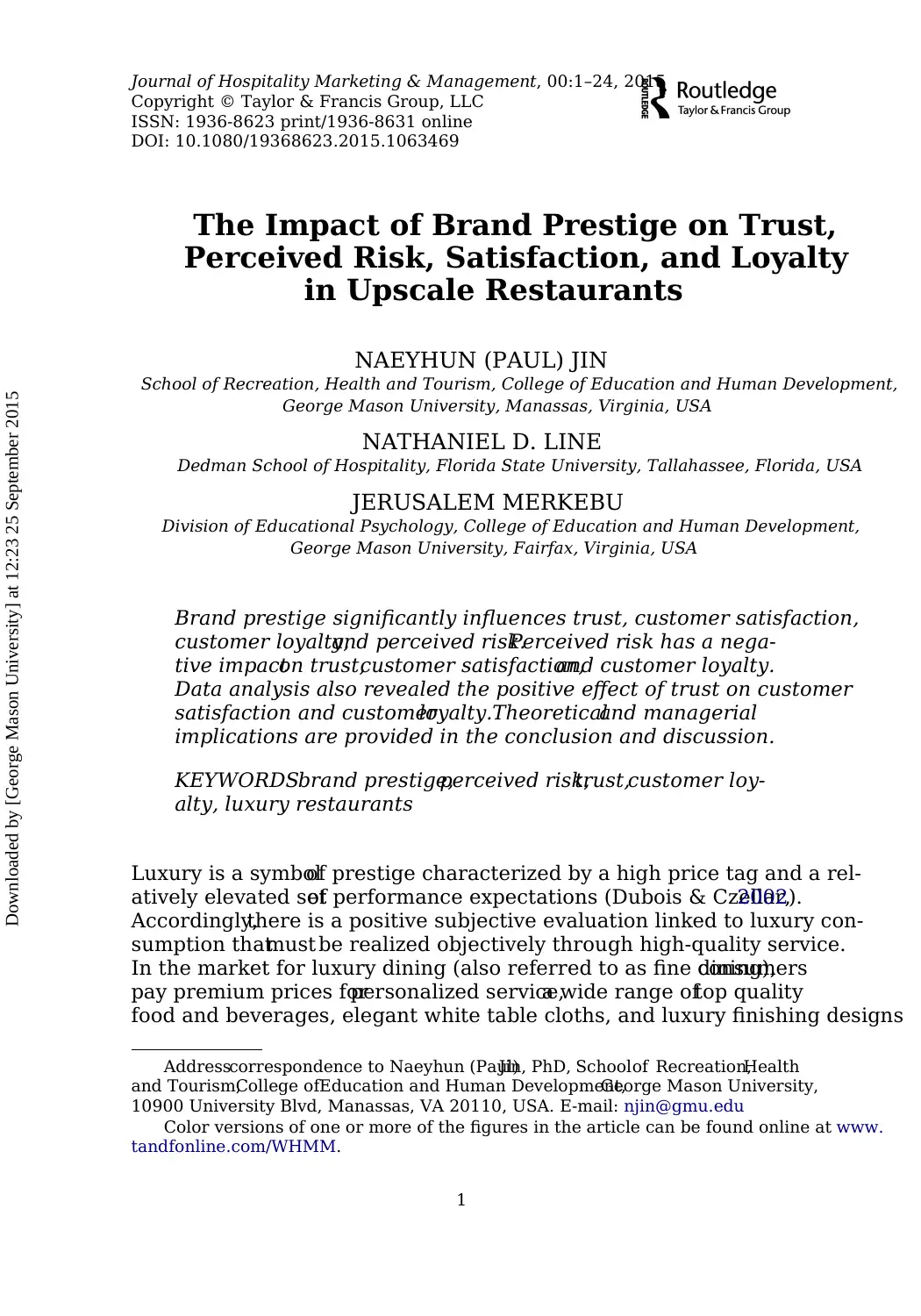
Journal of Hospitality Marketing & Management, 00:1–24, 2015
Copyright © Taylor & Francis Group, LLC
ISSN: 1936-8623 print/1936-8631 online
DOI: 10.1080/19368623.2015.1063469
The Impact of Brand Prestige on Trust,
Perceived Risk, Satisfaction, and Loyalty
in Upscale Restaurants
NAEYHUN (PAUL) JIN
School of Recreation, Health and Tourism, College of Education and Human Development,
George Mason University, Manassas, Virginia, USA
NATHANIEL D. LINE
Dedman School of Hospitality, Florida State University, Tallahassee, Florida, USA
JERUSALEM MERKEBU
Division of Educational Psychology, College of Education and Human Development,
George Mason University, Fairfax, Virginia, USA
Brand prestige significantly influences trust, customer satisfaction,
customer loyalty,and perceived risk.Perceived risk has a nega-
tive impacton trust,customer satisfaction,and customer loyalty.
Data analysis also revealed the positive effect of trust on customer
satisfaction and customerloyalty.Theoreticaland managerial
implications are provided in the conclusion and discussion.
KEYWORDSbrand prestige,perceived risk,trust,customer loy-
alty, luxury restaurants
Luxury is a symbolof prestige characterized by a high price tag and a rel-
atively elevated setof performance expectations (Dubois & Czellar,2002).
Accordingly,there is a positive subjective evaluation linked to luxury con-
sumption thatmust be realized objectively through high-quality service.
In the market for luxury dining (also referred to as fine dining),consumers
pay premium prices forpersonalized service,a wide range oftop quality
food and beverages, elegant white table cloths, and luxury finishing designs
Addresscorrespondence to Naeyhun (Paul)Jin, PhD, Schoolof Recreation,Health
and Tourism,College ofEducation and Human Development,George Mason University,
10900 University Blvd, Manassas, VA 20110, USA. E-mail: njin@gmu.edu
Color versions of one or more of the figures in the article can be found online at www.
tandfonline.com/WHMM.
1
Downloaded by [George Mason University] at 12:23 25 September 2015
Copyright © Taylor & Francis Group, LLC
ISSN: 1936-8623 print/1936-8631 online
DOI: 10.1080/19368623.2015.1063469
The Impact of Brand Prestige on Trust,
Perceived Risk, Satisfaction, and Loyalty
in Upscale Restaurants
NAEYHUN (PAUL) JIN
School of Recreation, Health and Tourism, College of Education and Human Development,
George Mason University, Manassas, Virginia, USA
NATHANIEL D. LINE
Dedman School of Hospitality, Florida State University, Tallahassee, Florida, USA
JERUSALEM MERKEBU
Division of Educational Psychology, College of Education and Human Development,
George Mason University, Fairfax, Virginia, USA
Brand prestige significantly influences trust, customer satisfaction,
customer loyalty,and perceived risk.Perceived risk has a nega-
tive impacton trust,customer satisfaction,and customer loyalty.
Data analysis also revealed the positive effect of trust on customer
satisfaction and customerloyalty.Theoreticaland managerial
implications are provided in the conclusion and discussion.
KEYWORDSbrand prestige,perceived risk,trust,customer loy-
alty, luxury restaurants
Luxury is a symbolof prestige characterized by a high price tag and a rel-
atively elevated setof performance expectations (Dubois & Czellar,2002).
Accordingly,there is a positive subjective evaluation linked to luxury con-
sumption thatmust be realized objectively through high-quality service.
In the market for luxury dining (also referred to as fine dining),consumers
pay premium prices forpersonalized service,a wide range oftop quality
food and beverages, elegant white table cloths, and luxury finishing designs
Addresscorrespondence to Naeyhun (Paul)Jin, PhD, Schoolof Recreation,Health
and Tourism,College ofEducation and Human Development,George Mason University,
10900 University Blvd, Manassas, VA 20110, USA. E-mail: njin@gmu.edu
Color versions of one or more of the figures in the article can be found online at www.
tandfonline.com/WHMM.
1
Downloaded by [George Mason University] at 12:23 25 September 2015
⊘ This is a preview!⊘
Do you want full access?
Subscribe today to unlock all pages.

Trusted by 1+ million students worldwide
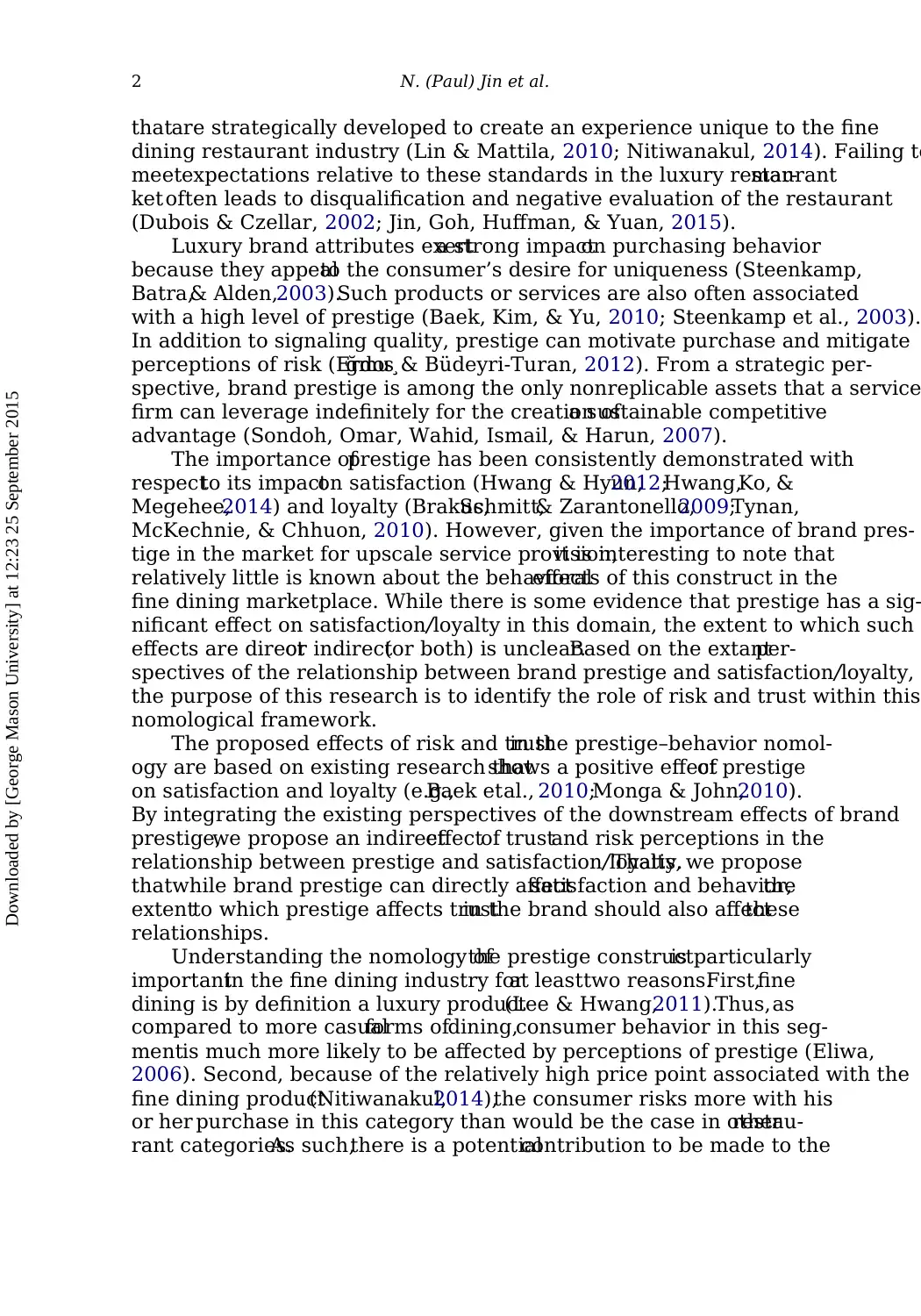
2 N. (Paul) Jin et al.
thatare strategically developed to create an experience unique to the fine
dining restaurant industry (Lin & Mattila, 2010; Nitiwanakul, 2014). Failing to
meetexpectations relative to these standards in the luxury restaurantmar-
ket often leads to disqualification and negative evaluation of the restaurant
(Dubois & Czellar, 2002; Jin, Goh, Huffman, & Yuan, 2015).
Luxury brand attributes exerta strong impacton purchasing behavior
because they appealto the consumer’s desire for uniqueness (Steenkamp,
Batra,& Alden,2003).Such products or services are also often associated
with a high level of prestige (Baek, Kim, & Yu, 2010; Steenkamp et al., 2003).
In addition to signaling quality, prestige can motivate purchase and mitigate
perceptions of risk (Erdo˘gmu¸s & Büdeyri-Turan, 2012). From a strategic per-
spective, brand prestige is among the only nonreplicable assets that a service
firm can leverage indefinitely for the creation ofa sustainable competitive
advantage (Sondoh, Omar, Wahid, Ismail, & Harun, 2007).
The importance ofprestige has been consistently demonstrated with
respectto its impacton satisfaction (Hwang & Hyun,2012;Hwang,Ko, &
Megehee,2014) and loyalty (Brakus,Schmitt,& Zarantonello,2009;Tynan,
McKechnie, & Chhuon, 2010). However, given the importance of brand pres-
tige in the market for upscale service provision,it is interesting to note that
relatively little is known about the behavioraleffects of this construct in the
fine dining marketplace. While there is some evidence that prestige has a sig-
nificant effect on satisfaction/loyalty in this domain, the extent to which such
effects are director indirect(or both) is unclear.Based on the extantper-
spectives of the relationship between brand prestige and satisfaction/loyalty,
the purpose of this research is to identify the role of risk and trust within this
nomological framework.
The proposed effects of risk and trustin the prestige–behavior nomol-
ogy are based on existing research thatshows a positive effectof prestige
on satisfaction and loyalty (e.g.,Baek etal., 2010;Monga & John,2010).
By integrating the existing perspectives of the downstream effects of brand
prestige,we propose an indirecteffectof trustand risk perceptions in the
relationship between prestige and satisfaction/loyalty.Thatis, we propose
thatwhile brand prestige can directly affectsatisfaction and behavior,the
extentto which prestige affects trustin the brand should also affectthese
relationships.
Understanding the nomology ofthe prestige constructis particularly
importantin the fine dining industry forat leasttwo reasons.First,fine
dining is by definition a luxury product(Lee & Hwang,2011).Thus,as
compared to more casualforms ofdining,consumer behavior in this seg-
mentis much more likely to be affected by perceptions of prestige (Eliwa,
2006). Second, because of the relatively high price point associated with the
fine dining product(Nitiwanakul,2014),the consumer risks more with his
or her purchase in this category than would be the case in otherrestau-
rant categories.As such,there is a potentialcontribution to be made to the
Downloaded by [George Mason University] at 12:23 25 September 2015
thatare strategically developed to create an experience unique to the fine
dining restaurant industry (Lin & Mattila, 2010; Nitiwanakul, 2014). Failing to
meetexpectations relative to these standards in the luxury restaurantmar-
ket often leads to disqualification and negative evaluation of the restaurant
(Dubois & Czellar, 2002; Jin, Goh, Huffman, & Yuan, 2015).
Luxury brand attributes exerta strong impacton purchasing behavior
because they appealto the consumer’s desire for uniqueness (Steenkamp,
Batra,& Alden,2003).Such products or services are also often associated
with a high level of prestige (Baek, Kim, & Yu, 2010; Steenkamp et al., 2003).
In addition to signaling quality, prestige can motivate purchase and mitigate
perceptions of risk (Erdo˘gmu¸s & Büdeyri-Turan, 2012). From a strategic per-
spective, brand prestige is among the only nonreplicable assets that a service
firm can leverage indefinitely for the creation ofa sustainable competitive
advantage (Sondoh, Omar, Wahid, Ismail, & Harun, 2007).
The importance ofprestige has been consistently demonstrated with
respectto its impacton satisfaction (Hwang & Hyun,2012;Hwang,Ko, &
Megehee,2014) and loyalty (Brakus,Schmitt,& Zarantonello,2009;Tynan,
McKechnie, & Chhuon, 2010). However, given the importance of brand pres-
tige in the market for upscale service provision,it is interesting to note that
relatively little is known about the behavioraleffects of this construct in the
fine dining marketplace. While there is some evidence that prestige has a sig-
nificant effect on satisfaction/loyalty in this domain, the extent to which such
effects are director indirect(or both) is unclear.Based on the extantper-
spectives of the relationship between brand prestige and satisfaction/loyalty,
the purpose of this research is to identify the role of risk and trust within this
nomological framework.
The proposed effects of risk and trustin the prestige–behavior nomol-
ogy are based on existing research thatshows a positive effectof prestige
on satisfaction and loyalty (e.g.,Baek etal., 2010;Monga & John,2010).
By integrating the existing perspectives of the downstream effects of brand
prestige,we propose an indirecteffectof trustand risk perceptions in the
relationship between prestige and satisfaction/loyalty.Thatis, we propose
thatwhile brand prestige can directly affectsatisfaction and behavior,the
extentto which prestige affects trustin the brand should also affectthese
relationships.
Understanding the nomology ofthe prestige constructis particularly
importantin the fine dining industry forat leasttwo reasons.First,fine
dining is by definition a luxury product(Lee & Hwang,2011).Thus,as
compared to more casualforms ofdining,consumer behavior in this seg-
mentis much more likely to be affected by perceptions of prestige (Eliwa,
2006). Second, because of the relatively high price point associated with the
fine dining product(Nitiwanakul,2014),the consumer risks more with his
or her purchase in this category than would be the case in otherrestau-
rant categories.As such,there is a potentialcontribution to be made to the
Downloaded by [George Mason University] at 12:23 25 September 2015
Paraphrase This Document
Need a fresh take? Get an instant paraphrase of this document with our AI Paraphraser
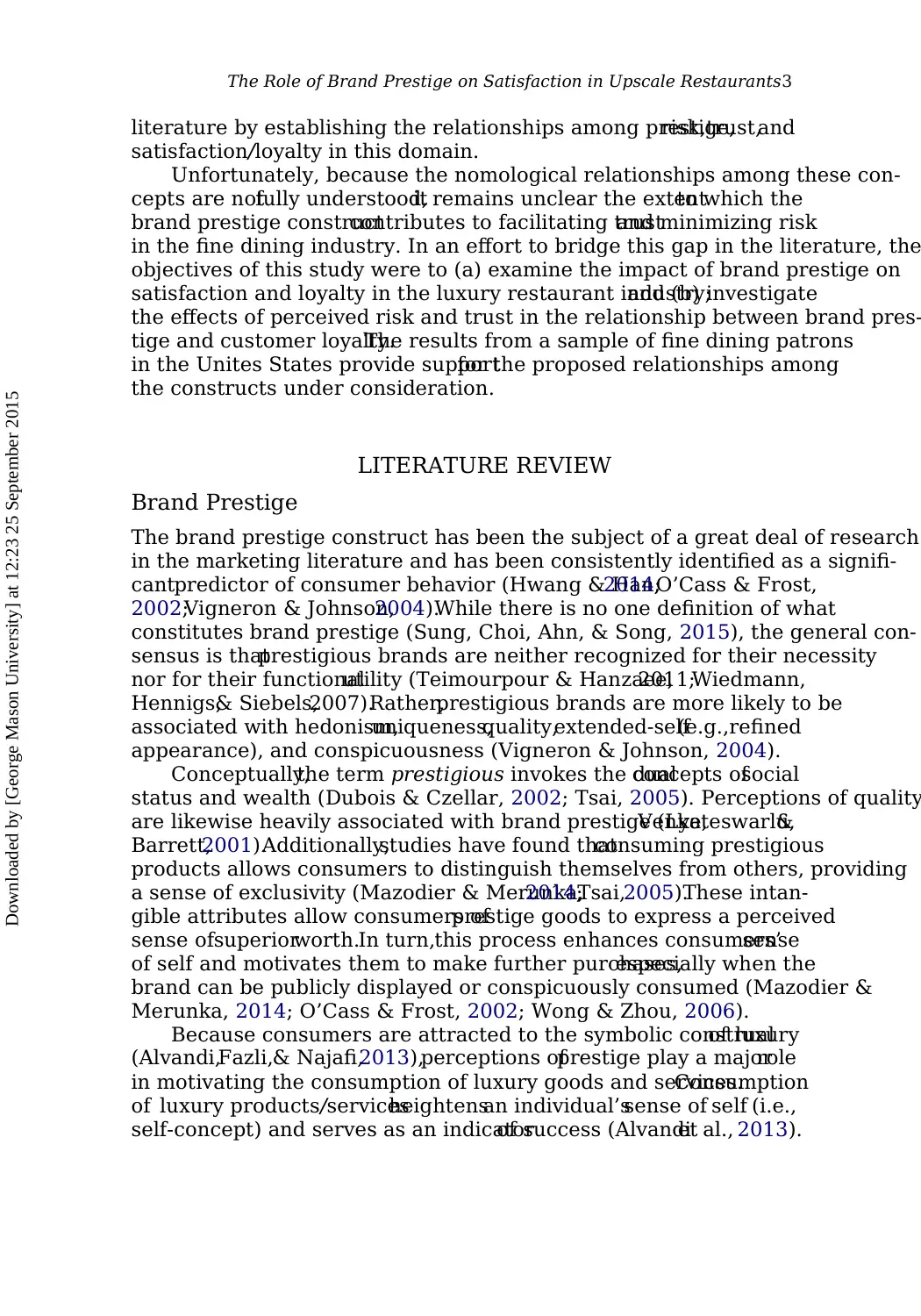
The Role of Brand Prestige on Satisfaction in Upscale Restaurants3
literature by establishing the relationships among prestige,risk,trust,and
satisfaction/loyalty in this domain.
Unfortunately, because the nomological relationships among these con-
cepts are notfully understood,it remains unclear the extentto which the
brand prestige constructcontributes to facilitating trustand minimizing risk
in the fine dining industry. In an effort to bridge this gap in the literature, the
objectives of this study were to (a) examine the impact of brand prestige on
satisfaction and loyalty in the luxury restaurant industry;and (b) investigate
the effects of perceived risk and trust in the relationship between brand pres-
tige and customer loyalty.The results from a sample of fine dining patrons
in the Unites States provide supportfor the proposed relationships among
the constructs under consideration.
LITERATURE REVIEW
Brand Prestige
The brand prestige construct has been the subject of a great deal of research
in the marketing literature and has been consistently identified as a signifi-
cantpredictor of consumer behavior (Hwang & Han,2014;O’Cass & Frost,
2002;Vigneron & Johnson,2004).While there is no one definition of what
constitutes brand prestige (Sung, Choi, Ahn, & Song, 2015), the general con-
sensus is thatprestigious brands are neither recognized for their necessity
nor for their functionalutility (Teimourpour & Hanzaee,2011;Wiedmann,
Hennigs,& Siebels,2007).Rather,prestigious brands are more likely to be
associated with hedonism,uniqueness,quality,extended-self(e.g.,refined
appearance), and conspicuousness (Vigneron & Johnson, 2004).
Conceptually,the term prestigious invokes the dualconcepts ofsocial
status and wealth (Dubois & Czellar, 2002; Tsai, 2005). Perceptions of quality
are likewise heavily associated with brand prestige (Lye,Venkateswarlu,&
Barrett,2001).Additionally,studies have found thatconsuming prestigious
products allows consumers to distinguish themselves from others, providing
a sense of exclusivity (Mazodier & Merunka,2014;Tsai,2005).These intan-
gible attributes allow consumers ofprestige goods to express a perceived
sense ofsuperiorworth.In turn,this process enhances consumers’sense
of self and motivates them to make further purchases,especially when the
brand can be publicly displayed or conspicuously consumed (Mazodier &
Merunka, 2014; O’Cass & Frost, 2002; Wong & Zhou, 2006).
Because consumers are attracted to the symbolic construalof luxury
(Alvandi,Fazli,& Najafi,2013),perceptions ofprestige play a majorrole
in motivating the consumption of luxury goods and services.Consumption
of luxury products/servicesheightensan individual’ssense of self (i.e.,
self-concept) and serves as an indicatorof success (Alvandiet al., 2013).
Downloaded by [George Mason University] at 12:23 25 September 2015
literature by establishing the relationships among prestige,risk,trust,and
satisfaction/loyalty in this domain.
Unfortunately, because the nomological relationships among these con-
cepts are notfully understood,it remains unclear the extentto which the
brand prestige constructcontributes to facilitating trustand minimizing risk
in the fine dining industry. In an effort to bridge this gap in the literature, the
objectives of this study were to (a) examine the impact of brand prestige on
satisfaction and loyalty in the luxury restaurant industry;and (b) investigate
the effects of perceived risk and trust in the relationship between brand pres-
tige and customer loyalty.The results from a sample of fine dining patrons
in the Unites States provide supportfor the proposed relationships among
the constructs under consideration.
LITERATURE REVIEW
Brand Prestige
The brand prestige construct has been the subject of a great deal of research
in the marketing literature and has been consistently identified as a signifi-
cantpredictor of consumer behavior (Hwang & Han,2014;O’Cass & Frost,
2002;Vigneron & Johnson,2004).While there is no one definition of what
constitutes brand prestige (Sung, Choi, Ahn, & Song, 2015), the general con-
sensus is thatprestigious brands are neither recognized for their necessity
nor for their functionalutility (Teimourpour & Hanzaee,2011;Wiedmann,
Hennigs,& Siebels,2007).Rather,prestigious brands are more likely to be
associated with hedonism,uniqueness,quality,extended-self(e.g.,refined
appearance), and conspicuousness (Vigneron & Johnson, 2004).
Conceptually,the term prestigious invokes the dualconcepts ofsocial
status and wealth (Dubois & Czellar, 2002; Tsai, 2005). Perceptions of quality
are likewise heavily associated with brand prestige (Lye,Venkateswarlu,&
Barrett,2001).Additionally,studies have found thatconsuming prestigious
products allows consumers to distinguish themselves from others, providing
a sense of exclusivity (Mazodier & Merunka,2014;Tsai,2005).These intan-
gible attributes allow consumers ofprestige goods to express a perceived
sense ofsuperiorworth.In turn,this process enhances consumers’sense
of self and motivates them to make further purchases,especially when the
brand can be publicly displayed or conspicuously consumed (Mazodier &
Merunka, 2014; O’Cass & Frost, 2002; Wong & Zhou, 2006).
Because consumers are attracted to the symbolic construalof luxury
(Alvandi,Fazli,& Najafi,2013),perceptions ofprestige play a majorrole
in motivating the consumption of luxury goods and services.Consumption
of luxury products/servicesheightensan individual’ssense of self (i.e.,
self-concept) and serves as an indicatorof success (Alvandiet al., 2013).
Downloaded by [George Mason University] at 12:23 25 September 2015
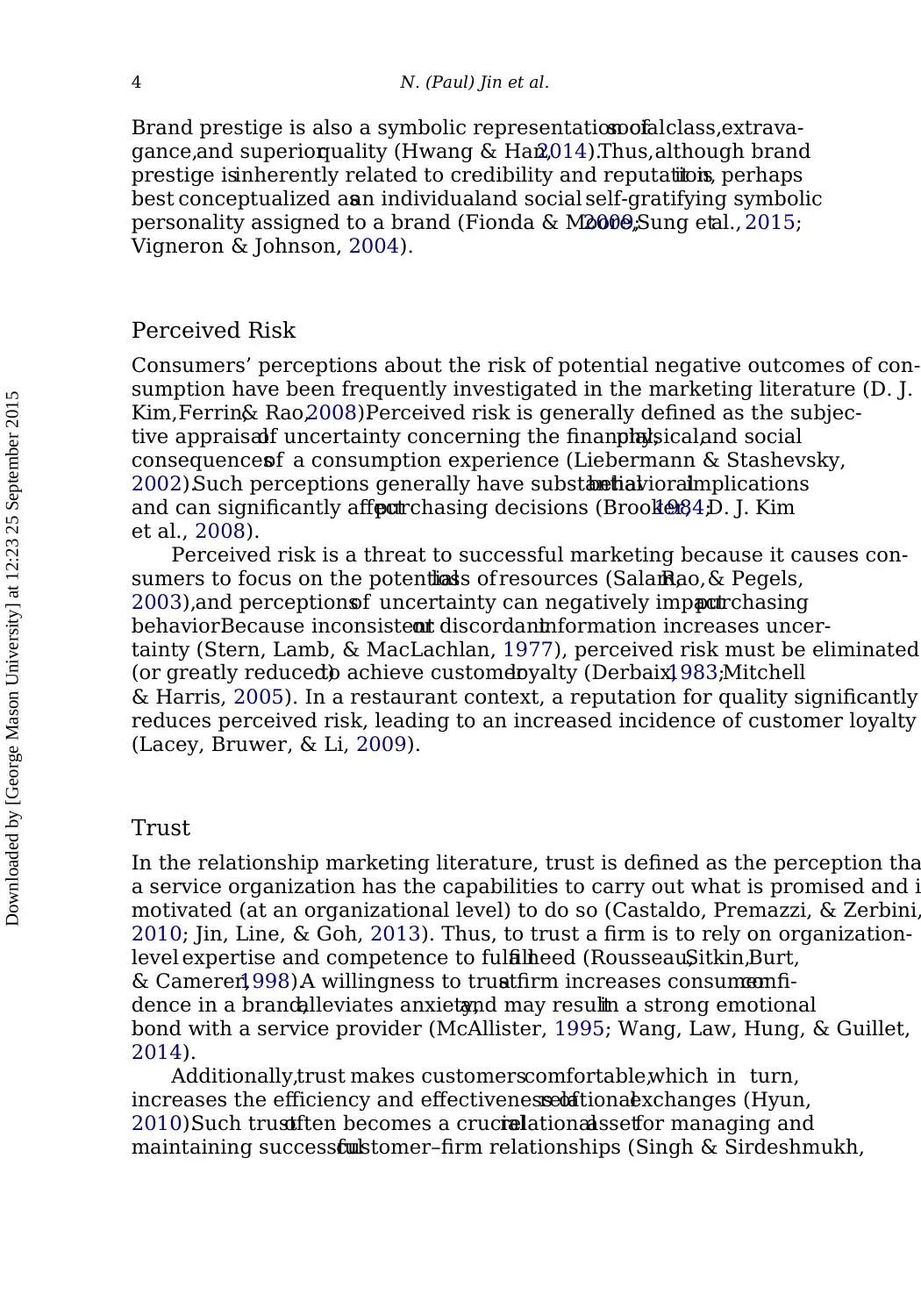
4 N. (Paul) Jin et al.
Brand prestige is also a symbolic representation ofsocialclass,extrava-
gance,and superiorquality (Hwang & Han,2014).Thus,although brand
prestige isinherently related to credibility and reputation,it is perhaps
best conceptualized asan individualand social self-gratifying symbolic
personality assigned to a brand (Fionda & Moore,2009;Sung etal., 2015;
Vigneron & Johnson, 2004).
Perceived Risk
Consumers’ perceptions about the risk of potential negative outcomes of con-
sumption have been frequently investigated in the marketing literature (D. J.
Kim,Ferrin,& Rao,2008).Perceived risk is generally defined as the subjec-
tive appraisalof uncertainty concerning the financial,physical,and social
consequencesof a consumption experience (Liebermann & Stashevsky,
2002).Such perceptions generally have substantialbehavioralimplications
and can significantly affectpurchasing decisions (Brooker,1984;D. J. Kim
et al., 2008).
Perceived risk is a threat to successful marketing because it causes con-
sumers to focus on the potentialloss of resources (Salam,Rao,& Pegels,
2003),and perceptionsof uncertainty can negatively impactpurchasing
behavior.Because inconsistentor discordantinformation increases uncer-
tainty (Stern, Lamb, & MacLachlan, 1977), perceived risk must be eliminated
(or greatly reduced)to achieve customerloyalty (Derbaix,1983;Mitchell
& Harris, 2005). In a restaurant context, a reputation for quality significantly
reduces perceived risk, leading to an increased incidence of customer loyalty
(Lacey, Bruwer, & Li, 2009).
Trust
In the relationship marketing literature, trust is defined as the perception tha
a service organization has the capabilities to carry out what is promised and i
motivated (at an organizational level) to do so (Castaldo, Premazzi, & Zerbini,
2010; Jin, Line, & Goh, 2013). Thus, to trust a firm is to rely on organization-
level expertise and competence to fulfilla need (Rousseau,Sitkin,Burt,
& Camerer,1998).A willingness to trusta firm increases consumerconfi-
dence in a brand,alleviates anxiety,and may resultin a strong emotional
bond with a service provider (McAllister, 1995; Wang, Law, Hung, & Guillet,
2014).
Additionally,trust makes customerscomfortable,which in turn,
increases the efficiency and effectiveness ofrelationalexchanges (Hyun,
2010).Such trustoften becomes a crucialrelationalassetfor managing and
maintaining successfulcustomer–firm relationships (Singh & Sirdeshmukh,
Downloaded by [George Mason University] at 12:23 25 September 2015
Brand prestige is also a symbolic representation ofsocialclass,extrava-
gance,and superiorquality (Hwang & Han,2014).Thus,although brand
prestige isinherently related to credibility and reputation,it is perhaps
best conceptualized asan individualand social self-gratifying symbolic
personality assigned to a brand (Fionda & Moore,2009;Sung etal., 2015;
Vigneron & Johnson, 2004).
Perceived Risk
Consumers’ perceptions about the risk of potential negative outcomes of con-
sumption have been frequently investigated in the marketing literature (D. J.
Kim,Ferrin,& Rao,2008).Perceived risk is generally defined as the subjec-
tive appraisalof uncertainty concerning the financial,physical,and social
consequencesof a consumption experience (Liebermann & Stashevsky,
2002).Such perceptions generally have substantialbehavioralimplications
and can significantly affectpurchasing decisions (Brooker,1984;D. J. Kim
et al., 2008).
Perceived risk is a threat to successful marketing because it causes con-
sumers to focus on the potentialloss of resources (Salam,Rao,& Pegels,
2003),and perceptionsof uncertainty can negatively impactpurchasing
behavior.Because inconsistentor discordantinformation increases uncer-
tainty (Stern, Lamb, & MacLachlan, 1977), perceived risk must be eliminated
(or greatly reduced)to achieve customerloyalty (Derbaix,1983;Mitchell
& Harris, 2005). In a restaurant context, a reputation for quality significantly
reduces perceived risk, leading to an increased incidence of customer loyalty
(Lacey, Bruwer, & Li, 2009).
Trust
In the relationship marketing literature, trust is defined as the perception tha
a service organization has the capabilities to carry out what is promised and i
motivated (at an organizational level) to do so (Castaldo, Premazzi, & Zerbini,
2010; Jin, Line, & Goh, 2013). Thus, to trust a firm is to rely on organization-
level expertise and competence to fulfilla need (Rousseau,Sitkin,Burt,
& Camerer,1998).A willingness to trusta firm increases consumerconfi-
dence in a brand,alleviates anxiety,and may resultin a strong emotional
bond with a service provider (McAllister, 1995; Wang, Law, Hung, & Guillet,
2014).
Additionally,trust makes customerscomfortable,which in turn,
increases the efficiency and effectiveness ofrelationalexchanges (Hyun,
2010).Such trustoften becomes a crucialrelationalassetfor managing and
maintaining successfulcustomer–firm relationships (Singh & Sirdeshmukh,
Downloaded by [George Mason University] at 12:23 25 September 2015
⊘ This is a preview!⊘
Do you want full access?
Subscribe today to unlock all pages.

Trusted by 1+ million students worldwide
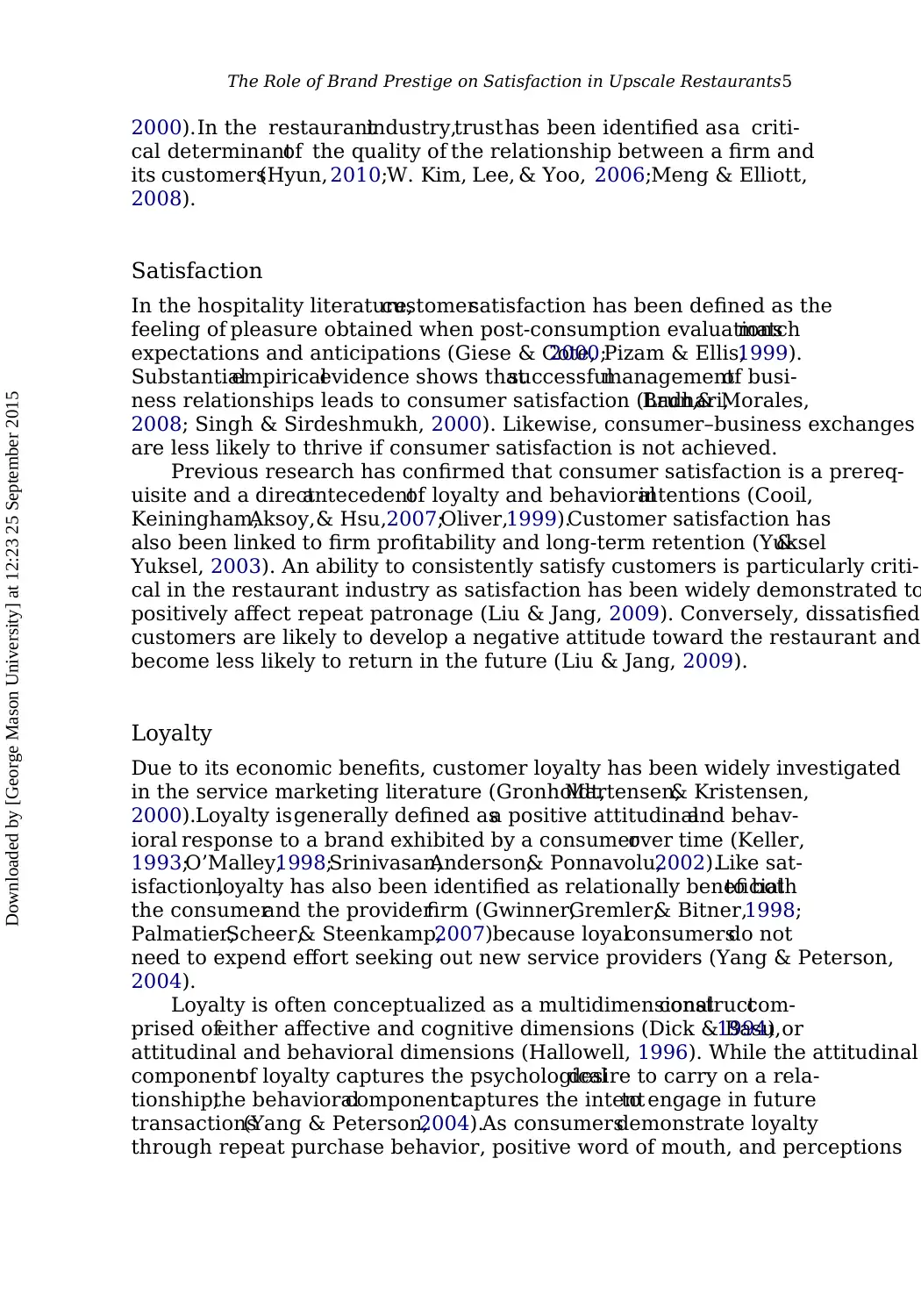
The Role of Brand Prestige on Satisfaction in Upscale Restaurants5
2000).In the restaurantindustry,trusthas been identified asa criti-
cal determinantof the quality of the relationship between a firm and
its customers(Hyun, 2010;W. Kim, Lee, & Yoo, 2006;Meng & Elliott,
2008).
Satisfaction
In the hospitality literature,customersatisfaction has been defined as the
feeling of pleasure obtained when post-consumption evaluationsmatch
expectations and anticipations (Giese & Cote,2000;Pizam & Ellis,1999).
Substantialempiricalevidence shows thatsuccessfulmanagementof busi-
ness relationships leads to consumer satisfaction (Ladhari,Brun,& Morales,
2008; Singh & Sirdeshmukh, 2000). Likewise, consumer–business exchanges
are less likely to thrive if consumer satisfaction is not achieved.
Previous research has confirmed that consumer satisfaction is a prereq-
uisite and a directantecedentof loyalty and behavioralintentions (Cooil,
Keiningham,Aksoy,& Hsu,2007;Oliver,1999).Customer satisfaction has
also been linked to firm profitability and long-term retention (Yuksel&
Yuksel, 2003). An ability to consistently satisfy customers is particularly criti-
cal in the restaurant industry as satisfaction has been widely demonstrated to
positively affect repeat patronage (Liu & Jang, 2009). Conversely, dissatisfied
customers are likely to develop a negative attitude toward the restaurant and
become less likely to return in the future (Liu & Jang, 2009).
Loyalty
Due to its economic benefits, customer loyalty has been widely investigated
in the service marketing literature (Gronholdt,Martensen,& Kristensen,
2000).Loyalty isgenerally defined asa positive attitudinaland behav-
ioral response to a brand exhibited by a consumerover time (Keller,
1993;O’Malley,1998;Srinivasan,Anderson,& Ponnavolu,2002).Like sat-
isfaction,loyalty has also been identified as relationally beneficialto both
the consumerand the providerfirm (Gwinner,Gremler,& Bitner,1998;
Palmatier,Scheer,& Steenkamp,2007)because loyalconsumersdo not
need to expend effort seeking out new service providers (Yang & Peterson,
2004).
Loyalty is often conceptualized as a multidimensionalconstructcom-
prised ofeither affective and cognitive dimensions (Dick & Basu,1994) or
attitudinal and behavioral dimensions (Hallowell, 1996). While the attitudinal
componentof loyalty captures the psychologicaldesire to carry on a rela-
tionship,the behavioralcomponentcaptures the intentto engage in future
transactions(Yang & Peterson,2004).As consumersdemonstrate loyalty
through repeat purchase behavior, positive word of mouth, and perceptions
Downloaded by [George Mason University] at 12:23 25 September 2015
2000).In the restaurantindustry,trusthas been identified asa criti-
cal determinantof the quality of the relationship between a firm and
its customers(Hyun, 2010;W. Kim, Lee, & Yoo, 2006;Meng & Elliott,
2008).
Satisfaction
In the hospitality literature,customersatisfaction has been defined as the
feeling of pleasure obtained when post-consumption evaluationsmatch
expectations and anticipations (Giese & Cote,2000;Pizam & Ellis,1999).
Substantialempiricalevidence shows thatsuccessfulmanagementof busi-
ness relationships leads to consumer satisfaction (Ladhari,Brun,& Morales,
2008; Singh & Sirdeshmukh, 2000). Likewise, consumer–business exchanges
are less likely to thrive if consumer satisfaction is not achieved.
Previous research has confirmed that consumer satisfaction is a prereq-
uisite and a directantecedentof loyalty and behavioralintentions (Cooil,
Keiningham,Aksoy,& Hsu,2007;Oliver,1999).Customer satisfaction has
also been linked to firm profitability and long-term retention (Yuksel&
Yuksel, 2003). An ability to consistently satisfy customers is particularly criti-
cal in the restaurant industry as satisfaction has been widely demonstrated to
positively affect repeat patronage (Liu & Jang, 2009). Conversely, dissatisfied
customers are likely to develop a negative attitude toward the restaurant and
become less likely to return in the future (Liu & Jang, 2009).
Loyalty
Due to its economic benefits, customer loyalty has been widely investigated
in the service marketing literature (Gronholdt,Martensen,& Kristensen,
2000).Loyalty isgenerally defined asa positive attitudinaland behav-
ioral response to a brand exhibited by a consumerover time (Keller,
1993;O’Malley,1998;Srinivasan,Anderson,& Ponnavolu,2002).Like sat-
isfaction,loyalty has also been identified as relationally beneficialto both
the consumerand the providerfirm (Gwinner,Gremler,& Bitner,1998;
Palmatier,Scheer,& Steenkamp,2007)because loyalconsumersdo not
need to expend effort seeking out new service providers (Yang & Peterson,
2004).
Loyalty is often conceptualized as a multidimensionalconstructcom-
prised ofeither affective and cognitive dimensions (Dick & Basu,1994) or
attitudinal and behavioral dimensions (Hallowell, 1996). While the attitudinal
componentof loyalty captures the psychologicaldesire to carry on a rela-
tionship,the behavioralcomponentcaptures the intentto engage in future
transactions(Yang & Peterson,2004).As consumersdemonstrate loyalty
through repeat purchase behavior, positive word of mouth, and perceptions
Downloaded by [George Mason University] at 12:23 25 September 2015
Paraphrase This Document
Need a fresh take? Get an instant paraphrase of this document with our AI Paraphraser
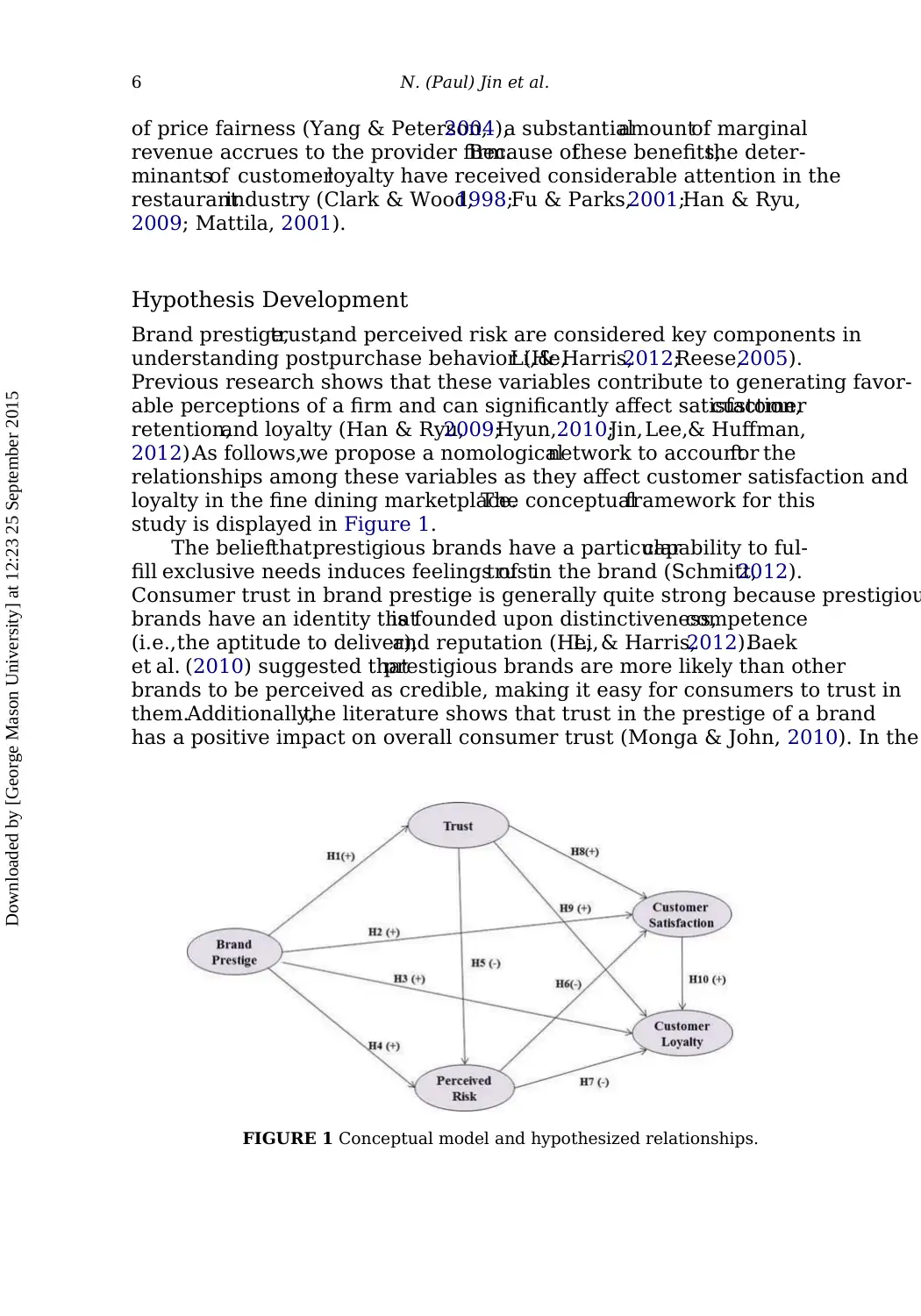
6 N. (Paul) Jin et al.
of price fairness (Yang & Peterson,2004),a substantialamountof marginal
revenue accrues to the provider firm.Because ofthese benefits,the deter-
minantsof customerloyalty have received considerable attention in the
restaurantindustry (Clark & Wood,1998;Fu & Parks,2001;Han & Ryu,
2009; Mattila, 2001).
Hypothesis Development
Brand prestige,trust,and perceived risk are considered key components in
understanding postpurchase behavior (He,Li,& Harris,2012;Reese,2005).
Previous research shows that these variables contribute to generating favor-
able perceptions of a firm and can significantly affect satisfaction,customer
retention,and loyalty (Han & Ryu,2009;Hyun,2010;Jin, Lee,& Huffman,
2012).As follows,we propose a nomologicalnetwork to accountfor the
relationships among these variables as they affect customer satisfaction and
loyalty in the fine dining marketplace.The conceptualframework for this
study is displayed in Figure 1.
The beliefthatprestigious brands have a particularcapability to ful-
fill exclusive needs induces feelings oftrustin the brand (Schmitt,2012).
Consumer trust in brand prestige is generally quite strong because prestigiou
brands have an identity thatis founded upon distinctiveness,competence
(i.e.,the aptitude to deliver),and reputation (He,Li,& Harris,2012).Baek
et al. (2010) suggested thatprestigious brands are more likely than other
brands to be perceived as credible, making it easy for consumers to trust in
them.Additionally,the literature shows that trust in the prestige of a brand
has a positive impact on overall consumer trust (Monga & John, 2010). In the
FIGURE 1 Conceptual model and hypothesized relationships.
Downloaded by [George Mason University] at 12:23 25 September 2015
of price fairness (Yang & Peterson,2004),a substantialamountof marginal
revenue accrues to the provider firm.Because ofthese benefits,the deter-
minantsof customerloyalty have received considerable attention in the
restaurantindustry (Clark & Wood,1998;Fu & Parks,2001;Han & Ryu,
2009; Mattila, 2001).
Hypothesis Development
Brand prestige,trust,and perceived risk are considered key components in
understanding postpurchase behavior (He,Li,& Harris,2012;Reese,2005).
Previous research shows that these variables contribute to generating favor-
able perceptions of a firm and can significantly affect satisfaction,customer
retention,and loyalty (Han & Ryu,2009;Hyun,2010;Jin, Lee,& Huffman,
2012).As follows,we propose a nomologicalnetwork to accountfor the
relationships among these variables as they affect customer satisfaction and
loyalty in the fine dining marketplace.The conceptualframework for this
study is displayed in Figure 1.
The beliefthatprestigious brands have a particularcapability to ful-
fill exclusive needs induces feelings oftrustin the brand (Schmitt,2012).
Consumer trust in brand prestige is generally quite strong because prestigiou
brands have an identity thatis founded upon distinctiveness,competence
(i.e.,the aptitude to deliver),and reputation (He,Li,& Harris,2012).Baek
et al. (2010) suggested thatprestigious brands are more likely than other
brands to be perceived as credible, making it easy for consumers to trust in
them.Additionally,the literature shows that trust in the prestige of a brand
has a positive impact on overall consumer trust (Monga & John, 2010). In the
FIGURE 1 Conceptual model and hypothesized relationships.
Downloaded by [George Mason University] at 12:23 25 September 2015
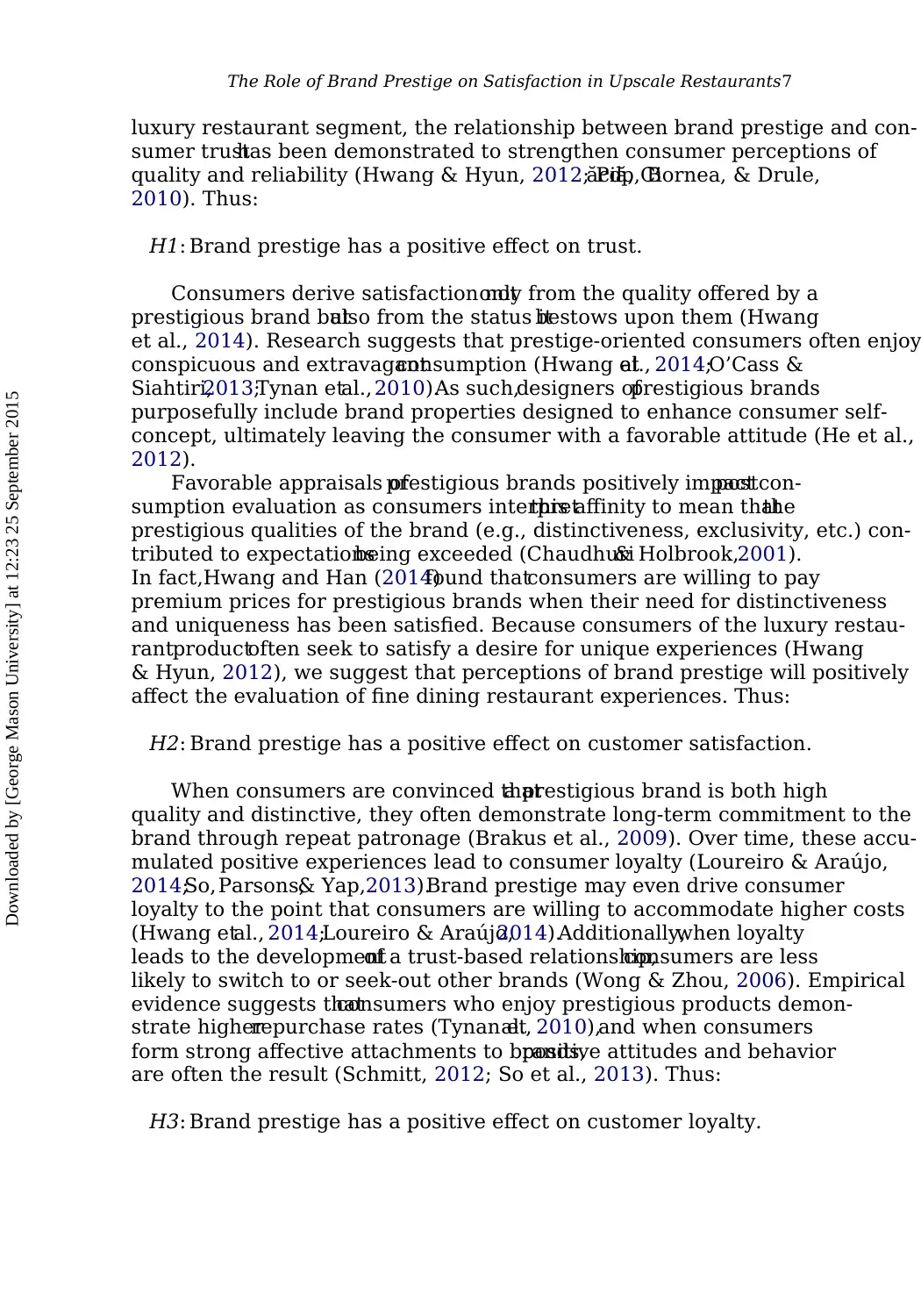
The Role of Brand Prestige on Satisfaction in Upscale Restaurants7
luxury restaurant segment, the relationship between brand prestige and con-
sumer trusthas been demonstrated to strengthen consumer perceptions of
quality and reliability (Hwang & Hyun, 2012; Pop, B˘acil˘a, Ciornea, & Drule,
2010). Thus:
H1: Brand prestige has a positive effect on trust.
Consumers derive satisfaction notonly from the quality offered by a
prestigious brand butalso from the status itbestows upon them (Hwang
et al., 2014). Research suggests that prestige-oriented consumers often enjoy
conspicuous and extravagantconsumption (Hwang etal., 2014;O’Cass &
Siahtiri,2013;Tynan etal., 2010).As such,designers ofprestigious brands
purposefully include brand properties designed to enhance consumer self-
concept, ultimately leaving the consumer with a favorable attitude (He et al.,
2012).
Favorable appraisals ofprestigious brands positively impactpostcon-
sumption evaluation as consumers interpretthis affinity to mean thatthe
prestigious qualities of the brand (e.g., distinctiveness, exclusivity, etc.) con-
tributed to expectationsbeing exceeded (Chaudhuri& Holbrook,2001).
In fact,Hwang and Han (2014)found thatconsumers are willing to pay
premium prices for prestigious brands when their need for distinctiveness
and uniqueness has been satisfied. Because consumers of the luxury restau-
rantproductoften seek to satisfy a desire for unique experiences (Hwang
& Hyun, 2012), we suggest that perceptions of brand prestige will positively
affect the evaluation of fine dining restaurant experiences. Thus:
H2: Brand prestige has a positive effect on customer satisfaction.
When consumers are convinced thata prestigious brand is both high
quality and distinctive, they often demonstrate long-term commitment to the
brand through repeat patronage (Brakus et al., 2009). Over time, these accu-
mulated positive experiences lead to consumer loyalty (Loureiro & Araújo,
2014;So, Parsons,& Yap,2013).Brand prestige may even drive consumer
loyalty to the point that consumers are willing to accommodate higher costs
(Hwang etal., 2014;Loureiro & Araújo,2014).Additionally,when loyalty
leads to the developmentof a trust-based relationship,consumers are less
likely to switch to or seek-out other brands (Wong & Zhou, 2006). Empirical
evidence suggests thatconsumers who enjoy prestigious products demon-
strate higherrepurchase rates (Tynan etal., 2010),and when consumers
form strong affective attachments to brands,positive attitudes and behavior
are often the result (Schmitt, 2012; So et al., 2013). Thus:
H3: Brand prestige has a positive effect on customer loyalty.
Downloaded by [George Mason University] at 12:23 25 September 2015
luxury restaurant segment, the relationship between brand prestige and con-
sumer trusthas been demonstrated to strengthen consumer perceptions of
quality and reliability (Hwang & Hyun, 2012; Pop, B˘acil˘a, Ciornea, & Drule,
2010). Thus:
H1: Brand prestige has a positive effect on trust.
Consumers derive satisfaction notonly from the quality offered by a
prestigious brand butalso from the status itbestows upon them (Hwang
et al., 2014). Research suggests that prestige-oriented consumers often enjoy
conspicuous and extravagantconsumption (Hwang etal., 2014;O’Cass &
Siahtiri,2013;Tynan etal., 2010).As such,designers ofprestigious brands
purposefully include brand properties designed to enhance consumer self-
concept, ultimately leaving the consumer with a favorable attitude (He et al.,
2012).
Favorable appraisals ofprestigious brands positively impactpostcon-
sumption evaluation as consumers interpretthis affinity to mean thatthe
prestigious qualities of the brand (e.g., distinctiveness, exclusivity, etc.) con-
tributed to expectationsbeing exceeded (Chaudhuri& Holbrook,2001).
In fact,Hwang and Han (2014)found thatconsumers are willing to pay
premium prices for prestigious brands when their need for distinctiveness
and uniqueness has been satisfied. Because consumers of the luxury restau-
rantproductoften seek to satisfy a desire for unique experiences (Hwang
& Hyun, 2012), we suggest that perceptions of brand prestige will positively
affect the evaluation of fine dining restaurant experiences. Thus:
H2: Brand prestige has a positive effect on customer satisfaction.
When consumers are convinced thata prestigious brand is both high
quality and distinctive, they often demonstrate long-term commitment to the
brand through repeat patronage (Brakus et al., 2009). Over time, these accu-
mulated positive experiences lead to consumer loyalty (Loureiro & Araújo,
2014;So, Parsons,& Yap,2013).Brand prestige may even drive consumer
loyalty to the point that consumers are willing to accommodate higher costs
(Hwang etal., 2014;Loureiro & Araújo,2014).Additionally,when loyalty
leads to the developmentof a trust-based relationship,consumers are less
likely to switch to or seek-out other brands (Wong & Zhou, 2006). Empirical
evidence suggests thatconsumers who enjoy prestigious products demon-
strate higherrepurchase rates (Tynan etal., 2010),and when consumers
form strong affective attachments to brands,positive attitudes and behavior
are often the result (Schmitt, 2012; So et al., 2013). Thus:
H3: Brand prestige has a positive effect on customer loyalty.
Downloaded by [George Mason University] at 12:23 25 September 2015
⊘ This is a preview!⊘
Do you want full access?
Subscribe today to unlock all pages.

Trusted by 1+ million students worldwide
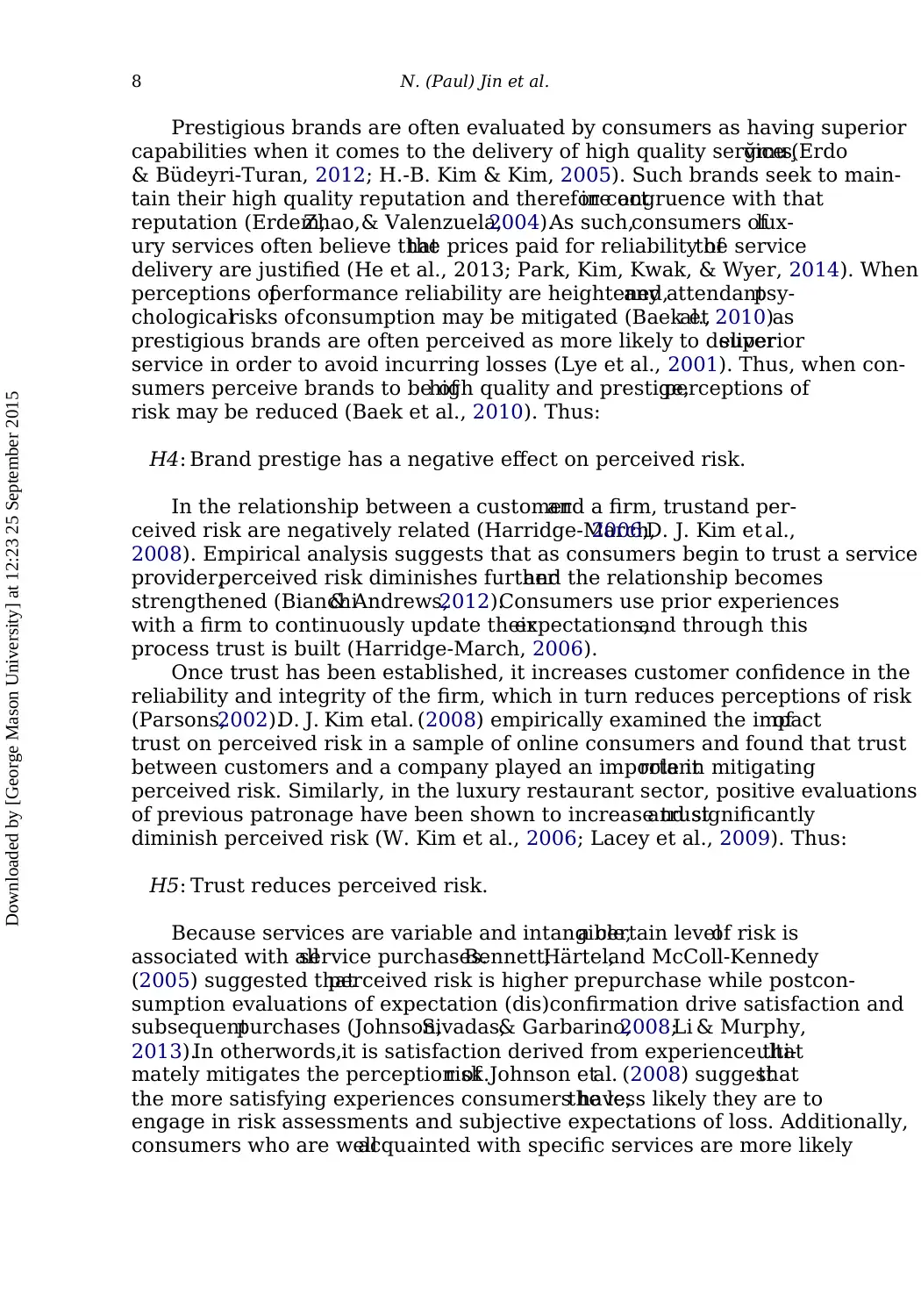
8 N. (Paul) Jin et al.
Prestigious brands are often evaluated by consumers as having superior
capabilities when it comes to the delivery of high quality service (Erdo˘gmu¸s
& Büdeyri-Turan, 2012; H.-B. Kim & Kim, 2005). Such brands seek to main-
tain their high quality reputation and therefore actin congruence with that
reputation (Erdem,Zhao,& Valenzuela,2004).As such,consumers oflux-
ury services often believe thatthe prices paid for reliability ofthe service
delivery are justified (He et al., 2013; Park, Kim, Kwak, & Wyer, 2014). When
perceptions ofperformance reliability are heightened,any attendantpsy-
chologicalrisks ofconsumption may be mitigated (Baek etal., 2010)as
prestigious brands are often perceived as more likely to deliversuperior
service in order to avoid incurring losses (Lye et al., 2001). Thus, when con-
sumers perceive brands to be ofhigh quality and prestige,perceptions of
risk may be reduced (Baek et al., 2010). Thus:
H4: Brand prestige has a negative effect on perceived risk.
In the relationship between a customerand a firm, trustand per-
ceived risk are negatively related (Harridge-March,2006;D. J. Kim et al.,
2008). Empirical analysis suggests that as consumers begin to trust a service
provider,perceived risk diminishes furtherand the relationship becomes
strengthened (Bianchi& Andrews,2012).Consumers use prior experiences
with a firm to continuously update theirexpectations,and through this
process trust is built (Harridge-March, 2006).
Once trust has been established, it increases customer confidence in the
reliability and integrity of the firm, which in turn reduces perceptions of risk
(Parsons,2002).D. J. Kim etal. (2008) empirically examined the impactof
trust on perceived risk in a sample of online consumers and found that trust
between customers and a company played an importantrole in mitigating
perceived risk. Similarly, in the luxury restaurant sector, positive evaluations
of previous patronage have been shown to increase trustand significantly
diminish perceived risk (W. Kim et al., 2006; Lacey et al., 2009). Thus:
H5: Trust reduces perceived risk.
Because services are variable and intangible,a certain levelof risk is
associated with allservice purchases.Bennett,Härtel,and McColl-Kennedy
(2005) suggested thatperceived risk is higher prepurchase while postcon-
sumption evaluations of expectation (dis)confirmation drive satisfaction and
subsequentpurchases (Johnson,Sivadas,& Garbarino,2008;Li & Murphy,
2013).In otherwords,it is satisfaction derived from experience thatulti-
mately mitigates the perception ofrisk.Johnson etal. (2008) suggestthat
the more satisfying experiences consumers have,the less likely they are to
engage in risk assessments and subjective expectations of loss. Additionally,
consumers who are wellacquainted with specific services are more likely
Downloaded by [George Mason University] at 12:23 25 September 2015
Prestigious brands are often evaluated by consumers as having superior
capabilities when it comes to the delivery of high quality service (Erdo˘gmu¸s
& Büdeyri-Turan, 2012; H.-B. Kim & Kim, 2005). Such brands seek to main-
tain their high quality reputation and therefore actin congruence with that
reputation (Erdem,Zhao,& Valenzuela,2004).As such,consumers oflux-
ury services often believe thatthe prices paid for reliability ofthe service
delivery are justified (He et al., 2013; Park, Kim, Kwak, & Wyer, 2014). When
perceptions ofperformance reliability are heightened,any attendantpsy-
chologicalrisks ofconsumption may be mitigated (Baek etal., 2010)as
prestigious brands are often perceived as more likely to deliversuperior
service in order to avoid incurring losses (Lye et al., 2001). Thus, when con-
sumers perceive brands to be ofhigh quality and prestige,perceptions of
risk may be reduced (Baek et al., 2010). Thus:
H4: Brand prestige has a negative effect on perceived risk.
In the relationship between a customerand a firm, trustand per-
ceived risk are negatively related (Harridge-March,2006;D. J. Kim et al.,
2008). Empirical analysis suggests that as consumers begin to trust a service
provider,perceived risk diminishes furtherand the relationship becomes
strengthened (Bianchi& Andrews,2012).Consumers use prior experiences
with a firm to continuously update theirexpectations,and through this
process trust is built (Harridge-March, 2006).
Once trust has been established, it increases customer confidence in the
reliability and integrity of the firm, which in turn reduces perceptions of risk
(Parsons,2002).D. J. Kim etal. (2008) empirically examined the impactof
trust on perceived risk in a sample of online consumers and found that trust
between customers and a company played an importantrole in mitigating
perceived risk. Similarly, in the luxury restaurant sector, positive evaluations
of previous patronage have been shown to increase trustand significantly
diminish perceived risk (W. Kim et al., 2006; Lacey et al., 2009). Thus:
H5: Trust reduces perceived risk.
Because services are variable and intangible,a certain levelof risk is
associated with allservice purchases.Bennett,Härtel,and McColl-Kennedy
(2005) suggested thatperceived risk is higher prepurchase while postcon-
sumption evaluations of expectation (dis)confirmation drive satisfaction and
subsequentpurchases (Johnson,Sivadas,& Garbarino,2008;Li & Murphy,
2013).In otherwords,it is satisfaction derived from experience thatulti-
mately mitigates the perception ofrisk.Johnson etal. (2008) suggestthat
the more satisfying experiences consumers have,the less likely they are to
engage in risk assessments and subjective expectations of loss. Additionally,
consumers who are wellacquainted with specific services are more likely
Downloaded by [George Mason University] at 12:23 25 September 2015
Paraphrase This Document
Need a fresh take? Get an instant paraphrase of this document with our AI Paraphraser
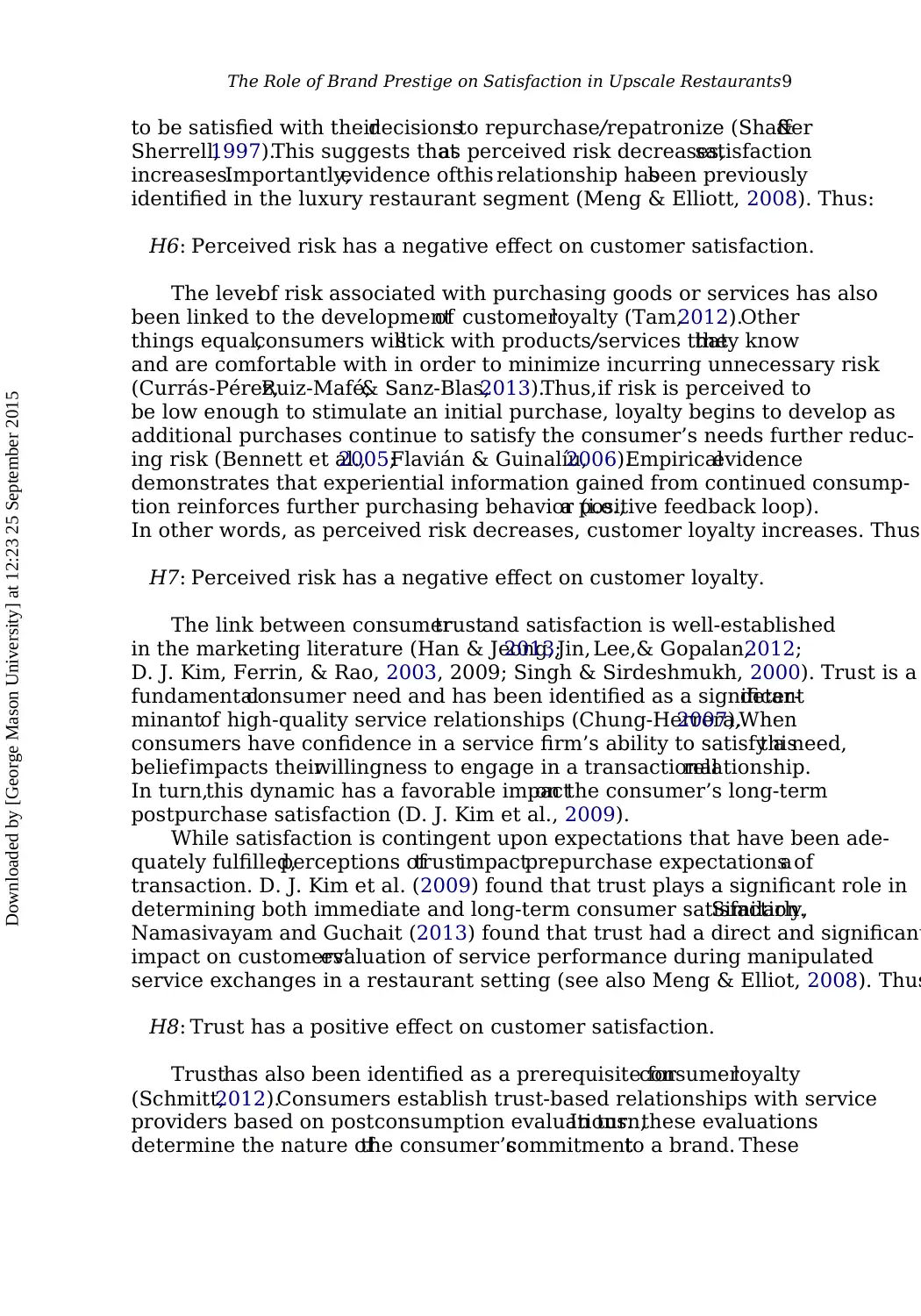
The Role of Brand Prestige on Satisfaction in Upscale Restaurants9
to be satisfied with theirdecisionsto repurchase/repatronize (Shaffer&
Sherrell,1997).This suggests thatas perceived risk decreases,satisfaction
increases.Importantly,evidence ofthis relationship hasbeen previously
identified in the luxury restaurant segment (Meng & Elliott, 2008). Thus:
H6: Perceived risk has a negative effect on customer satisfaction.
The levelof risk associated with purchasing goods or services has also
been linked to the developmentof customerloyalty (Tam,2012).Other
things equal,consumers willstick with products/services thatthey know
and are comfortable with in order to minimize incurring unnecessary risk
(Currás-Pérez,Ruiz-Mafé,& Sanz-Blas,2013).Thus,if risk is perceived to
be low enough to stimulate an initial purchase, loyalty begins to develop as
additional purchases continue to satisfy the consumer’s needs further reduc-
ing risk (Bennett et al.,2005;Flavián & Guinalíu,2006).Empiricalevidence
demonstrates that experiential information gained from continued consump-
tion reinforces further purchasing behavior (i.e.,a positive feedback loop).
In other words, as perceived risk decreases, customer loyalty increases. Thus:
H7: Perceived risk has a negative effect on customer loyalty.
The link between consumertrustand satisfaction is well-established
in the marketing literature (Han & Jeong,2013;Jin, Lee,& Gopalan,2012;
D. J. Kim, Ferrin, & Rao, 2003, 2009; Singh & Sirdeshmukh, 2000). Trust is a
fundamentalconsumer need and has been identified as a significantdeter-
minantof high-quality service relationships (Chung-Herrera,2007).When
consumers have confidence in a service firm’s ability to satisfy a need,this
beliefimpacts theirwillingness to engage in a transactionalrelationship.
In turn,this dynamic has a favorable impacton the consumer’s long-term
postpurchase satisfaction (D. J. Kim et al., 2009).
While satisfaction is contingent upon expectations that have been ade-
quately fulfilled,perceptions oftrustimpactprepurchase expectations ofa
transaction. D. J. Kim et al. (2009) found that trust plays a significant role in
determining both immediate and long-term consumer satisfaction.Similarly,
Namasivayam and Guchait (2013) found that trust had a direct and significant
impact on customers’evaluation of service performance during manipulated
service exchanges in a restaurant setting (see also Meng & Elliot, 2008). Thus
H8: Trust has a positive effect on customer satisfaction.
Trusthas also been identified as a prerequisite forconsumerloyalty
(Schmitt,2012).Consumers establish trust-based relationships with service
providers based on postconsumption evaluations.In turn,these evaluations
determine the nature ofthe consumer’scommitmentto a brand. These
Downloaded by [George Mason University] at 12:23 25 September 2015
to be satisfied with theirdecisionsto repurchase/repatronize (Shaffer&
Sherrell,1997).This suggests thatas perceived risk decreases,satisfaction
increases.Importantly,evidence ofthis relationship hasbeen previously
identified in the luxury restaurant segment (Meng & Elliott, 2008). Thus:
H6: Perceived risk has a negative effect on customer satisfaction.
The levelof risk associated with purchasing goods or services has also
been linked to the developmentof customerloyalty (Tam,2012).Other
things equal,consumers willstick with products/services thatthey know
and are comfortable with in order to minimize incurring unnecessary risk
(Currás-Pérez,Ruiz-Mafé,& Sanz-Blas,2013).Thus,if risk is perceived to
be low enough to stimulate an initial purchase, loyalty begins to develop as
additional purchases continue to satisfy the consumer’s needs further reduc-
ing risk (Bennett et al.,2005;Flavián & Guinalíu,2006).Empiricalevidence
demonstrates that experiential information gained from continued consump-
tion reinforces further purchasing behavior (i.e.,a positive feedback loop).
In other words, as perceived risk decreases, customer loyalty increases. Thus:
H7: Perceived risk has a negative effect on customer loyalty.
The link between consumertrustand satisfaction is well-established
in the marketing literature (Han & Jeong,2013;Jin, Lee,& Gopalan,2012;
D. J. Kim, Ferrin, & Rao, 2003, 2009; Singh & Sirdeshmukh, 2000). Trust is a
fundamentalconsumer need and has been identified as a significantdeter-
minantof high-quality service relationships (Chung-Herrera,2007).When
consumers have confidence in a service firm’s ability to satisfy a need,this
beliefimpacts theirwillingness to engage in a transactionalrelationship.
In turn,this dynamic has a favorable impacton the consumer’s long-term
postpurchase satisfaction (D. J. Kim et al., 2009).
While satisfaction is contingent upon expectations that have been ade-
quately fulfilled,perceptions oftrustimpactprepurchase expectations ofa
transaction. D. J. Kim et al. (2009) found that trust plays a significant role in
determining both immediate and long-term consumer satisfaction.Similarly,
Namasivayam and Guchait (2013) found that trust had a direct and significant
impact on customers’evaluation of service performance during manipulated
service exchanges in a restaurant setting (see also Meng & Elliot, 2008). Thus
H8: Trust has a positive effect on customer satisfaction.
Trusthas also been identified as a prerequisite forconsumerloyalty
(Schmitt,2012).Consumers establish trust-based relationships with service
providers based on postconsumption evaluations.In turn,these evaluations
determine the nature ofthe consumer’scommitmentto a brand. These
Downloaded by [George Mason University] at 12:23 25 September 2015
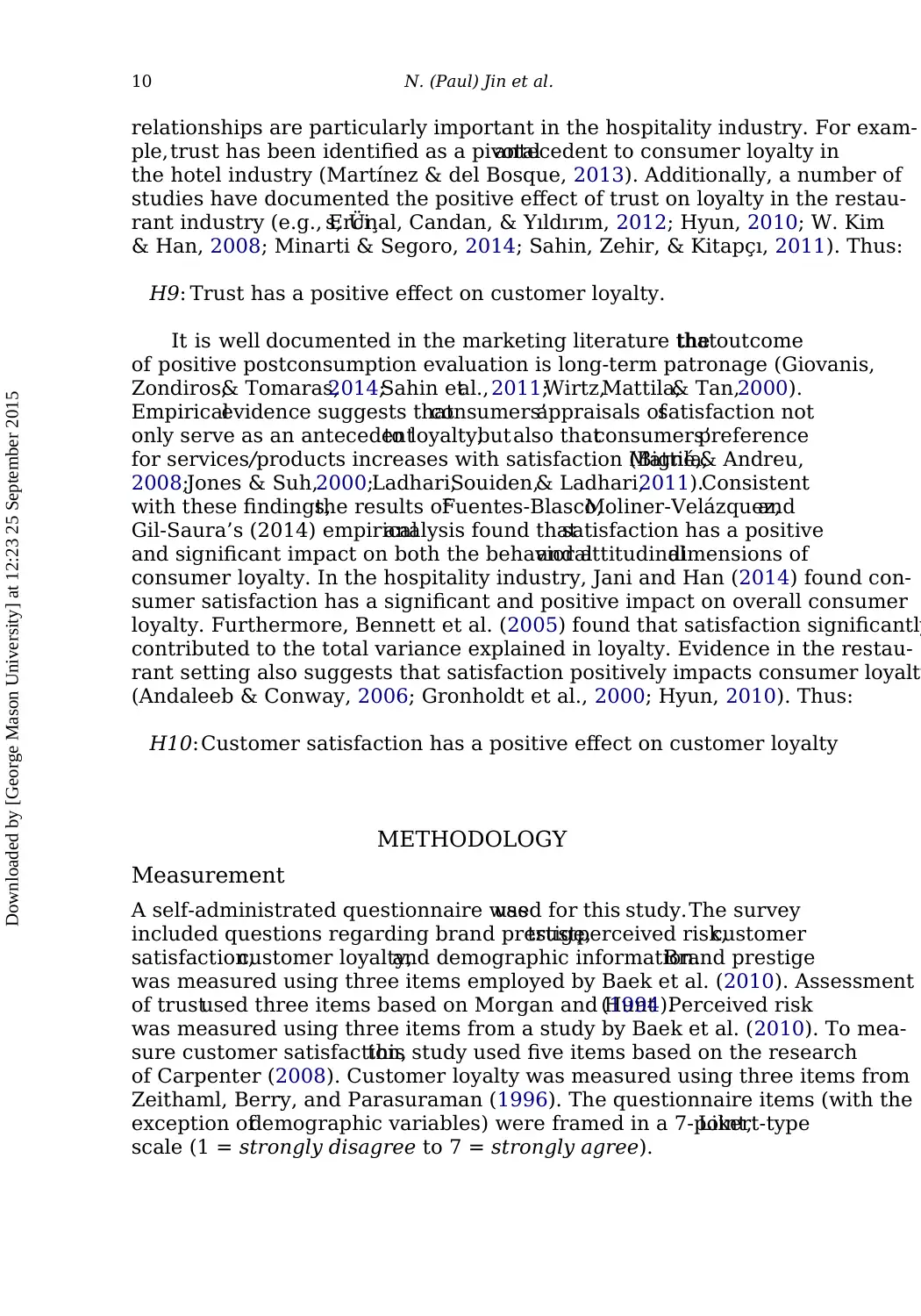
10 N. (Paul) Jin et al.
relationships are particularly important in the hospitality industry. For exam-
ple,trust has been identified as a pivotalantecedent to consumer loyalty in
the hotel industry (Martínez & del Bosque, 2013). Additionally, a number of
studies have documented the positive effect of trust on loyalty in the restau-
rant industry (e.g., Erci¸s, Ünal, Candan, & Yıldırım, 2012; Hyun, 2010; W. Kim
& Han, 2008; Minarti & Segoro, 2014; Sahin, Zehir, & Kitapçı, 2011). Thus:
H9: Trust has a positive effect on customer loyalty.
It is well documented in the marketing literature thatthe outcome
of positive postconsumption evaluation is long-term patronage (Giovanis,
Zondiros,& Tomaras,2014;Sahin etal., 2011;Wirtz,Mattila,& Tan,2000).
Empiricalevidence suggests thatconsumers’appraisals ofsatisfaction not
only serve as an antecedentto loyalty,but also thatconsumers’preference
for services/products increases with satisfaction (Bigné,Mattila,& Andreu,
2008;Jones & Suh,2000;Ladhari,Souiden,& Ladhari,2011).Consistent
with these findings,the results ofFuentes-Blasco,Moliner-Velázquez,and
Gil-Saura’s (2014) empiricalanalysis found thatsatisfaction has a positive
and significant impact on both the behavioraland attitudinaldimensions of
consumer loyalty. In the hospitality industry, Jani and Han (2014) found con-
sumer satisfaction has a significant and positive impact on overall consumer
loyalty. Furthermore, Bennett et al. (2005) found that satisfaction significantly
contributed to the total variance explained in loyalty. Evidence in the restau-
rant setting also suggests that satisfaction positively impacts consumer loyalty
(Andaleeb & Conway, 2006; Gronholdt et al., 2000; Hyun, 2010). Thus:
H10:Customer satisfaction has a positive effect on customer loyalty
METHODOLOGY
Measurement
A self-administrated questionnaire wasused for this study.The survey
included questions regarding brand prestige,trust,perceived risk,customer
satisfaction,customer loyalty,and demographic information.Brand prestige
was measured using three items employed by Baek et al. (2010). Assessment
of trustused three items based on Morgan and Hunt(1994).Perceived risk
was measured using three items from a study by Baek et al. (2010). To mea-
sure customer satisfaction,this study used five items based on the research
of Carpenter (2008). Customer loyalty was measured using three items from
Zeithaml, Berry, and Parasuraman (1996). The questionnaire items (with the
exception ofdemographic variables) were framed in a 7-point,Likert-type
scale (1 = strongly disagree to 7 = strongly agree).
Downloaded by [George Mason University] at 12:23 25 September 2015
relationships are particularly important in the hospitality industry. For exam-
ple,trust has been identified as a pivotalantecedent to consumer loyalty in
the hotel industry (Martínez & del Bosque, 2013). Additionally, a number of
studies have documented the positive effect of trust on loyalty in the restau-
rant industry (e.g., Erci¸s, Ünal, Candan, & Yıldırım, 2012; Hyun, 2010; W. Kim
& Han, 2008; Minarti & Segoro, 2014; Sahin, Zehir, & Kitapçı, 2011). Thus:
H9: Trust has a positive effect on customer loyalty.
It is well documented in the marketing literature thatthe outcome
of positive postconsumption evaluation is long-term patronage (Giovanis,
Zondiros,& Tomaras,2014;Sahin etal., 2011;Wirtz,Mattila,& Tan,2000).
Empiricalevidence suggests thatconsumers’appraisals ofsatisfaction not
only serve as an antecedentto loyalty,but also thatconsumers’preference
for services/products increases with satisfaction (Bigné,Mattila,& Andreu,
2008;Jones & Suh,2000;Ladhari,Souiden,& Ladhari,2011).Consistent
with these findings,the results ofFuentes-Blasco,Moliner-Velázquez,and
Gil-Saura’s (2014) empiricalanalysis found thatsatisfaction has a positive
and significant impact on both the behavioraland attitudinaldimensions of
consumer loyalty. In the hospitality industry, Jani and Han (2014) found con-
sumer satisfaction has a significant and positive impact on overall consumer
loyalty. Furthermore, Bennett et al. (2005) found that satisfaction significantly
contributed to the total variance explained in loyalty. Evidence in the restau-
rant setting also suggests that satisfaction positively impacts consumer loyalty
(Andaleeb & Conway, 2006; Gronholdt et al., 2000; Hyun, 2010). Thus:
H10:Customer satisfaction has a positive effect on customer loyalty
METHODOLOGY
Measurement
A self-administrated questionnaire wasused for this study.The survey
included questions regarding brand prestige,trust,perceived risk,customer
satisfaction,customer loyalty,and demographic information.Brand prestige
was measured using three items employed by Baek et al. (2010). Assessment
of trustused three items based on Morgan and Hunt(1994).Perceived risk
was measured using three items from a study by Baek et al. (2010). To mea-
sure customer satisfaction,this study used five items based on the research
of Carpenter (2008). Customer loyalty was measured using three items from
Zeithaml, Berry, and Parasuraman (1996). The questionnaire items (with the
exception ofdemographic variables) were framed in a 7-point,Likert-type
scale (1 = strongly disagree to 7 = strongly agree).
Downloaded by [George Mason University] at 12:23 25 September 2015
⊘ This is a preview!⊘
Do you want full access?
Subscribe today to unlock all pages.

Trusted by 1+ million students worldwide
1 out of 26
Your All-in-One AI-Powered Toolkit for Academic Success.
+13062052269
info@desklib.com
Available 24*7 on WhatsApp / Email
![[object Object]](/_next/static/media/star-bottom.7253800d.svg)
Unlock your academic potential
Copyright © 2020–2025 A2Z Services. All Rights Reserved. Developed and managed by ZUCOL.


